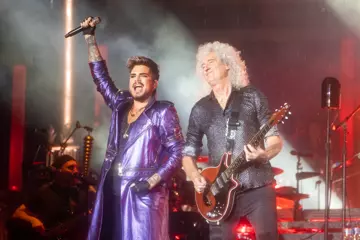Cornelius plays the Arena on Thursday.
At 17, Keigo Oyamada --aka Cornelius-- formed his first band, Flipper's Guitar; a boysy teen-pop combo who achieved screaming-hordes-of-girls type fame in his native Japan. Five years on, when Oyamada quit the band, he stumbled into a job helming Trattoria Sound records, a label that had already been set-up to release the final album, and posthumous live-disc, for Flipper's Guitar. Over the next decade, Trattoria would dig up relics from The Free Design, Bill Wyman, and the Planet Of The Apes movies, would release a slew of American pop-bands in Japan (The Apples In Stereo, Papas Fritas, The Legendary Jim Ruiz Group, etc), and would help cultivate a community in Tokyo's Shibuya district that would become beloved by pop music fans worldwide (Kahimi Karie, Takako Minekawa, Seagull Screaming Kiss Her Kiss Her, Hideki Kaji. And, they'd release Oyamada's albums under his new alias, Cornelius.
Cornelius's first offering, the Holidays In The Sun EP, was issued in late 1992, when he was still just 23; and it was soon followed up with his debut album, First Question Award. After a couple of live-videos and a trio of cassingles(!), 1996 brought with it the second Cornelius album, 69/96. It was on this album that the particular 'sound' of Cornelius --with influences from dippy 60s pop to My Bloody Valentine-ish wall-of-noise, fused together via the art of the studio - started to blossom. And, it was this album that won the attention of Matador recs honchos Gerard Cosloy and Chris Lombardi; so, by 1998 and the next Cornelius disc, Fantasma, Oyamada was being sold to the western world for the first time since his teen-pop days; Fantasma finding all kinds of critical acclaim and healthy rest-of-the-world sales for Matador.
"I didn't have any particular concepts in terms of how it'd sound when I first started Cornelius. But, I did decide that instead of putting out a stage-name or my name as a sort of 'celebrity' name, that I'd choose the name Cornelius as a sort of universal band-name," Oyamada says. "I liked that option: that the name could be me, one-person, or that it could be a group; that's why I chose Cornelius. If I used my own name it could only ever be just me, be just my music, and I wanted to be able to include other people. For example, I work together with my engineer: we could be called Cornelius. And, when I work with a band for a live-show, we can all be called Cornelius. But, basically, it's just myself. When I record, I work with an engineer. When I play live, I work with a band."
With only the help of an engineer, Cornelius builds his albums, himself, in the studio. Labours-of-love, the parts - mostly basic rock-n-roll instruments; gtr/bass/drms/etc - are laid down assiduously by Oyamada, then shaped into songs, songs then strung out into multi-song 'movements', the movements then brought together as a final album. Oyamada's records as Cornelius - from 69/96 through to his latest, fourth album, Point - seem to be the ultimate in 'albums'; with a worked-over feeling and a tight productional aesthetic; seeming, even, at times, to be like concept records.
Don't miss a beat with our FREE daily newsletter
Oyamada, however, hardly plots these things out. "I don't really have any specific concept in mind for each album. Often, I won't even have any songs written before I start working in the studio. I'll just go in and start recording, and take it from there, and see where it leads me," he says.
"I have an image or thought that I would like the album to be like in the beginning, and then I'll look back at my previous albums for similarity with the new stuff, and choose out the themes / shapes from there," he furthers. "I can't hear things beforehand, but there's definitely 'images' in my head: parts, guitar riffs, themes of songs. But, when I start on these things, it invariably grows, sometimes by accident, sometimes influenced by the weather. It's mostly small things that grow, and I take them from there, and make shapes from them."
It becomes obvious, when you hear Oyamada speak of his working ways, that he is as much the studio-hound as his album's dense, carefully-woven sounds make him out to be. Further to such a notion, he even offers: "I don't have any particular scheduled studio-time assigned for the recording of each album. I go in the studio every day, and record something, or try something; try to come up with an idea, and then keep working on that idea, to see what it becomes. Gradually, I make finished songs this way, and when these all add up, I have an album."
Asked if it's intensive, focused, good old-fashioned hard-work, though, Oyamada is a little unsure how his work relays to more menial employments: "I can't really compare my work to any other kind, and I can't really explain how intensive the labour on it is, because it's hard to quantify it like it's work," he says. "Basically, Point took a full year of work, and it was really hard, but this is my hobby, something that I love doing, that I enjoy devoting time to, so it's both hard work and a pleasure at the same time."
And, he's not keen to be painted as the full-picture of a studio-boffin. No, he says, he's not anti-social, and, no, he says, he doesn't feel more comfortable behind a desk than he does on stage. "I do spend a lot of time in the studio, yes, but I also really love to play live shows," says Oyamada. "Each of these are completely different endeavours, I see them as completely separate, so I can't really say whether I'm more of a studio musician at heart than a live musician or not. I am both of these things, just at different times."
















